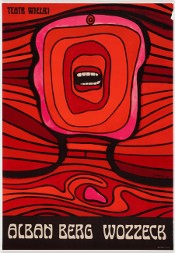Alban Berg’s music is so visual that Wozzeck could lend itself extremely well to semi-staging, so this performance, at the Royal Festival Hall on London’s South Bank might have been a chance to see something truly innovative. Most of the action in this opera happens in the minds of the protagonists. So much is said in musical imagery that a concert performance can be inherently dramatic even without props. Berg builds patterns and mazes into his music, and the solo parts in the orchestra act as roles within a symphony of sound.
Unfortunately this performance turned out to be a lost opportunity. It was the final concert in an ambitious series titled “Vienna: City of Dreams 1900-1930”. Ostensibly, the concerts were part of a wider panorama presenting the music in the context of Vienna at a time of unprecedented developments, in music, literature, philosophy,art and psychology. Perhaps the message had to be blunted because the music of the Second Viennese School doesn’t promise box office success. So perhaps it was too much to expect a production that referenced the innovations in theater design that were part of Vienna’s significance. Musically, though, performances have been extremely strong. Esa-Pekka Salonen has proved his worth as head of the Philharmonia. He and this orchestra, arguably London’s finest, are an excellent match. Their performance of Schoenberg’s Gurrelieder in February was exceptionally good and fortunately was recorded. The CD is now available.
Wozzeck demands great orchestral forces, so visual impact is already built into a semi-staged performance. A sensitive production could even have made capital of the situation, focusing on what happens in the orchestra,. Even the fact that there’s barely a yard between music and and singers is no disadvantage: Wozzeck is about tight corners and entrapment.
In this performance, there was a huge screen behind the orchestra on which were projected many visual images - oil on water transparencies, montages, close-ups of the singers. This could have worked very well in theory, because Berg was interested in cinema, and his music lends itself to expression in film. In practice however, what happened on screen was busy rather than focused, distracting from rather than reinforcing the inherent drama in the music.
In opera, singers are singing “about” something. Context matters. Just as orchestral musicians need a conductor, singers need direction. Katarina Dalayman has sung Marie so often that we know what she’s capable of when truly inspired. Here she sang well, but wasn’t challenged to show her acting skills, which are usually considerable.
This was Simon Keenlyside’s debut as Wozzeck, eagerly awaited by his many admirers. Although he’s a light rather than dark baritone, at the higher registers he can catch the tension in the part, which subtly connects to the shrill tenor parts around him, and contrasts well with the bass Doctor, sung by Hans-Peter Scheidegger. Keenlyside’s forte, though, is his naturally elegant bearing. He looks aristocratic, whatever he does, even his stubble looked expensively manicured. This was a Wozzeck in designer khaki. This could well have worked, because the opera isn’t about outward appearances. With suitable direction, Keenlyside could have created character wearing a tuxedo. Wozzeck’s world is surreal, after all. Perhaps Keenlyside’s talents will be put to better use in future, more complete productions.
With semi-staging, detail counts even more than in full production. So why did Marie’s child appear in the final scene dressed in beautifully pressed, emerald green silk pajamas? We don’t know what the child’s future might be, but the indications aren’t hopeful. “Ringel, ringel Rosenkranz” sing the taunting children, and the words “Hopp, Hopp” indicate a repetitive child’s game . Berg’s fascination with circular forms and patterns would also imply the child might well end up like Wozzeck. If emerald green silk means anything, it should have been supported by other images and from the music. I also didn’t understand why the children walk on dressed in funereal black, like a cortege, Marie’s son following behind. It isn’t necessarily wrong but without substantiation it doesn’t add to the drama or to the meaning of the opera.
This is the dilemma of all stage direction faces. Visual images are open to all kinds of interpretation. They operate on many levels at the same time, and can be seen in different ways. That’s why stage direction is controversial, there’s never only one way of seeing things. Visual literacy is a skill, too, but perhaps we’ve been conditioned to TV and movies for so long, it’s a lost art. That’s why semi-staged performances are important because they concentrate the mind on the essentials of dramatic meaning. This production, directed by Jean-Baptiste Barrière seemed like grand opera manqué rather than focused concentration on the fundamentals in the drama. But getting the basics right is the key to all good direction.
Anne Ozorio
